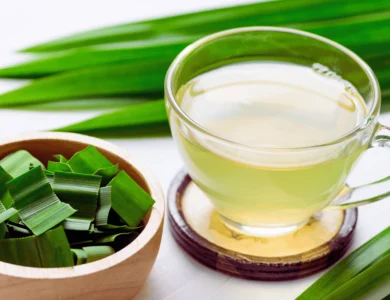
Welcome to our article on the incredible benefits of Rooibos Tea! If you’re looking for a delicious and healthy beverage without the jitters of caffeine, then this is the perfect drink for you. Rooibos tea, also known as red tea or red bush tea, is a caffeine-free herbal tea that has been enjoyed for centuries in southern Africa and is now gaining popularity worldwide.
Advocates of Rooibos tea rave about its potential health benefits. While more research is needed to fully understand and validate these claims, many believe that this amazing tea may offer protection against cancer, heart disease, and stroke. So, let’s dive into the world of Rooibos tea and explore its wide range of benefits for your overall health and well-being.
What is Rooibos Tea?
Rooibos tea, also known as red tea or red bush tea, is a herbal tea made from the leaves of a shrub called Aspalathus linearis. This shrub is native to the western coast of South Africa.
Unlike black or green tea, rooibos tea is not derived from the tea plant (Camellia sinensis). It is a caffeine-free alternative that offers a unique taste and numerous health benefits.
There are two types of rooibos tea: traditional rooibos and green rooibos. Traditional rooibos tea is created by fermenting the leaves, which gives it a distinct red-brown color and a slightly sweet flavor. Green rooibos, on the other hand, is not fermented and retains its natural green color.
Rooibos tea is considered an herbal tea because it does not contain any tea leaves from the Camellia sinensis plant. Instead, it is made solely from the leaves of Aspalathus linearis, making it a great option for those seeking caffeine-free alternatives.
Similar to black tea, rooibos tea can be enjoyed in various ways. It can be brewed hot or cold, and its versatile flavor profile makes it a popular choice for both standalone enjoyment and as a base for other beverages.
Caffeine-Free and Low in Tannins
When it comes to choosing a healthy beverage, rooibos tea stands out for its unique properties. One of the key benefits of rooibos tea is that it is caffeine-free, making it an excellent alternative for those looking to reduce their caffeine intake. Unlike black tea or green tea, which naturally contain caffeine, rooibos tea offers a soothing and relaxing experience without the stimulating effects of caffeine.
But that’s not all – rooibos tea also has lower tannin levels compared to its black and green counterparts. Tannins are natural compounds found in tea that can interfere with the absorption of certain nutrients, such as iron. By choosing rooibos tea, you can enjoy a refreshing brew without having to worry about potential nutrient absorption issues caused by tannins.
So, whether you’re looking for a caffeine-free option or want to optimize nutrient absorption, rooibos tea is an excellent choice. Its unique combination of being both caffeine-free and low in tannins makes it a standout among other teas.
As we continue our exploration of rooibos tea, let’s delve into its impressive array of antioxidants and their potential health benefits.
Packed with Antioxidants
Rooibos tea is a beverage that offers more than just a delightful taste. It is packed with antioxidants, including aspalathin and quercetin, which have numerous health benefits. Antioxidants play a crucial role in protecting our cells from the damaging effects of free radicals, unstable molecules that can lead to chronic conditions such as heart disease and cancer.
What makes rooibos tea particularly beneficial is its high concentration of aspalathin and quercetin. Aspalathin, in particular, has been shown to have potent antioxidant properties that can help neutralize free radicals and reduce oxidative stress in the body.
Studies have indicated that drinking rooibos tea can increase antioxidant levels in the body, which may contribute to overall health and well-being. However, it’s important to note that the effects of these antioxidants are relatively small and short-lived.
More research is needed to fully understand how the body absorbs and utilizes these antioxidants from rooibos tea, as well as their stability in the body over time.
To reap the antioxidant benefits of rooibos tea, consider incorporating it into your daily routine. Whether you enjoy it hot or cold, a cup of rooibos tea can be a delicious way to fortify your body with these health-promoting compounds.
Did you know? Aspalathin and quercetin, the antioxidants found in rooibos tea, are known for their potential anti-inflammatory effects, which may contribute to overall well-being.
Heart Health Benefits
Drinking Rooibos Tea may have beneficial effects on heart health. Studies have shown that Rooibos tea can inhibit the activity of angiotensin-converting enzyme (ACE), which can help lower blood pressure. High blood pressure is a risk factor for heart disease, heart attacks, and strokes. By incorporating Rooibos tea into your daily routine, you can potentially reduce your risk of these conditions.
In addition to its impact on blood pressure, Rooibos tea may also have a positive effect on cholesterol levels. Research suggests that Rooibos tea can help decrease LDL (bad) cholesterol levels and increase HDL (good) cholesterol levels. Maintaining healthy cholesterol levels is essential for heart health and can further reduce the risk of heart disease.
By enjoying a cup of Rooibos tea regularly, you can support your overall heart health and promote a healthier cardiovascular system. Incorporating Rooibos tea into your daily routine can be a simple and enjoyable way to prioritize your heart’s well-being.
Potential Diabetes Management
Research suggests that rooibos tea may be beneficial for individuals with diabetes by helping to manage blood sugar levels. The tea contains an antioxidant called aspalathin, which has shown promise in balancing blood sugar levels and reducing insulin resistance in animal studies.
However, it’s important to note that these effects have not been fully confirmed in human studies. Further research is needed to better understand the potential benefits of rooibos tea in diabetes management and its precise mechanisms of action.
Aspalathin, the antioxidant found in rooibos tea, may play a role in regulating blood sugar levels and improving insulin sensitivity. These potential benefits could offer support for managing diabetes, but additional research is required to validate these effects in human populations.
Unverified Benefits and Side Effects
While there are many anecdotal claims about the benefits of Rooibos Tea, such as improved bone health and digestion, it is important to note that the evidence to support these claims is currently lacking. More research is needed to confirm the potential benefits of Rooibos Tea on these aspects. However, it is worth mentioning that Rooibos Tea is generally considered safe to consume and is not associated with any significant side effects.
Occasional cases of liver enzyme increase have been reported, but they are rare and not well-understood. It’s always advisable to consume Rooibos Tea in moderation as part of a balanced diet. Avoid excessive intake and consult with a healthcare professional if you have any pre-existing health conditions or concerns.
Although Rooibos Tea is a delightful and popular beverage, it is important to remember that its benefits and potential risks may vary from person to person. It is best to approach it as a refreshing and caffeine-free alternative to other teas, enjoying it for its taste and potential health benefits, while keeping in mind that more scientific research is needed to verify its purported claims.
FAQ
What are the health benefits of rooibos tea?
Rooibos tea is rich in antioxidants and may have potential benefits for heart health, blood sugar management, and overall well-being. However, more research is needed to fully understand and validate these claims.
How is rooibos tea made?
Rooibos tea is made from the leaves of the Aspalathus linearis shrub, which is grown on the western coast of South Africa. Traditional rooibos tea is created by fermenting the leaves, while green rooibos is not fermented.
Is rooibos tea caffeine-free?
Yes, rooibos tea is a caffeine-free alternative to black and green tea, making it an excellent choice for those who want to avoid or limit their caffeine intake.
Does rooibos tea have lower tannin levels compared to black and green tea?
Yes, rooibos tea has lower tannin levels compared to black and green tea. Tannins can interfere with the absorption of certain nutrients, and choosing rooibos tea can help prevent these issues.
What antioxidants are found in rooibos tea?
Rooibos tea is rich in antioxidants, including aspalathin and quercetin, which have health-promoting properties and help protect cells from damage caused by free radicals.
Can rooibos tea benefit heart health?
Drinking rooibos tea may have beneficial effects on heart health. It has been shown to inhibit the activity of angiotensin-converting enzyme (ACE), lower blood pressure, and improve cholesterol levels.
Can rooibos tea help manage blood sugar levels in diabetes?
Research suggests that rooibos tea may help in managing blood sugar levels, thanks to the antioxidant aspalathin present in the tea. However, further research is needed to confirm these effects in humans.
What are the unverified benefits and side effects of rooibos tea?
While there are many anecdotal claims about the benefits of rooibos tea, such as improved bone health and digestion, more research is needed to confirm these benefits. Rooibos tea is generally safe to consume, with rare reports of liver enzyme increase.
Source Links
- webmd.com/diet/health-benefits-rooibos
- healthline.com/nutrition/rooibos-tea-benefits
- medicalnewstoday.com/articles/323637




